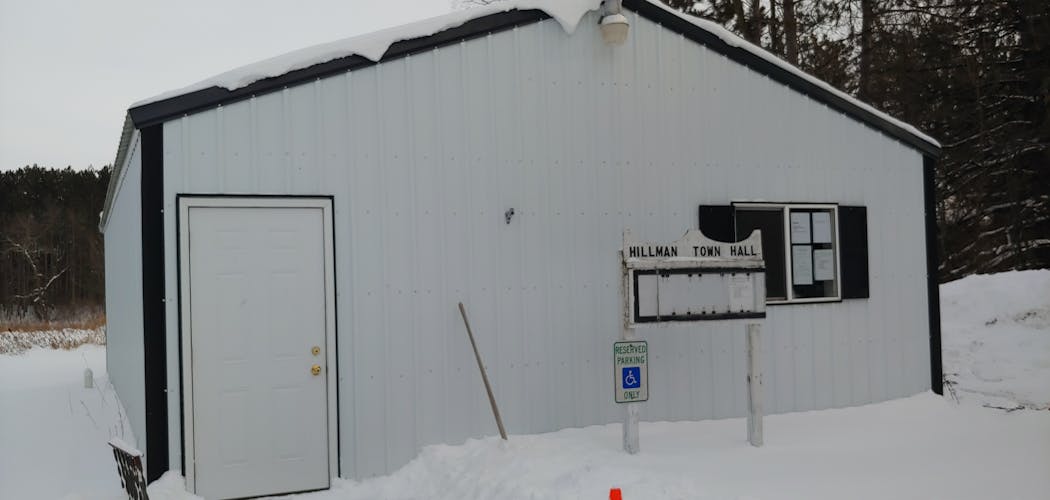There are more than 55,000 miles of township roads in Minnesota, but a half-mile of gravel in the state's central countryside could set a precedent for all the rest.
Late last month, Kanabec County's Hillman Township filed an appeal with the Minnesota Court of Appeals over a court ruling forcing it to maintain Hornet Street, the road to the home of Renee and Andy Crisman a few miles outside Mora.
The Crisman family and the township have been battling over Hornet Street for nearly five years, culminating in a proclamation by the township last summer that the road no longer legally exists.
The latest fight is over whether township voters can choose to maintain only the first quarter-mile of the half-mile road to the Crisman home. In an opinion filed last month, Kanabec County District Judge Stoney Hiljus ruled that Minnesota law doesn't allow township voters to selectively maintain only portions of their roads.
In effect, the judge ruled, it's all or nothing.
That ruling has galvanized the Minnesota Association of Townships (MAT), which represents 1,780 townships in the state that maintain rural gravel roads. If townships are forced to fully maintain little-used portions of their road networks, township officials say it would create a tremendous financial burden, as well as taking away the local authority over their roads granted by the Legislature.
"The ruling in the Hillman Township case has statewide impact, and MAT will seek permission to file a friend of the court brief in the appeal," the association said in a statement. "Hundreds of townships have short sections of road that have been unused and abandoned for decades. Lawmakers intended the township voters to decide whether such roads should be reopened.
"The ruling in the Hillman Township case fails to follow established precedent and strips voters of that power, compelling the town to open a road even though there is not public interest in doing so. It amounts to the taxpayers providing some landowners with a new driveway."
Township officials frustrated
Hillman Township officials say they're frustrated by accusations that they're being unfair to the Crisman family.
"The township has not got any fair coverage of this yet," said Ryan Martens, chair of the three-member Board of Supervisors. "The critics have never sat on this side of the table and dealt with this.
"Everybody thinks it's so easy for us to sit over there and make decisions."
The Crismans bought their 120-acre property in 2013 and moved there from the Twin Cities in 2017. The land had long been unoccupied, and the township hadn't been plowing or grading the road all the way to the Crismans' land.
After they moved in, the Crismans came to a town meeting and asked the township to maintain the road all the way to their place. Residents at the meeting voted it down. But a township supervisor told the Crismans that if they spent their own money to repair the road, they could come back for another vote and perhaps get a different outcome.
The second vote never happened. Instead, the Crismans sued, leading to the decision the township is now fighting.
Martens said he believes the Crismans might have gotten what they wanted if they'd come back for a second vote instead of suing. But the lawsuit forced the township to dig into its records on the road. And the more it dug, he said, the more questions were raised on the status of Hornet Street.
Chief among them, according to the township, was the discovery that Hornet Street hadn't been maintained in more than 25 years. Under state law, if a township hasn't maintained a road in more than 25 years, it can't resume maintenance unless voters approve it. Hillman Township officials have been adamant that they had no other option but to deny maintenance after voters turned down the Crismans' request.
"I want to help you, I really do," Supervisor Elaine Pierson told the Crismans at a recent township board meeting. "I'm sure you're very nice people. But how do I break the law?"
Crismans: Town should drop it
At this point, the township is the one keeping the dispute going, according to the Crismans.
"To be clear, the Crismans are not 'fighting' this matter," the family's attorney, Sarah Jewell, said. "For them, there is nothing here to fight. They already prevailed in this matter in District Court.
"Rather, the township is choosing to fight an unfavorable decision against it, rather than accepting the fact they were wrong in this case and that the District Court judge's decision to maintain all of Hornet Street … must be obeyed."
As things stand now, the judge's decision applies only to Hillman Township, Jewel added. By appealing the decision, the township risks an unfavorable ruling that would apply statewide.
"By filing an appeal, the township is running the risk that the appellate courts may very well side with … the Crisman family, who have been unfairly targeted by this board," she said. "They would be better off simply obeying Judge Hiljus' order so that it is just narrowly limited to Hillman Township."
An earlier ruling by Hiljus had gone against the Crismans, but they asked the judge to reconsider based on a legal point that hadn't been clearly decided. He then reversed himself, ruling in their favor. Martens said it's "hypocritical" of the Crismans to criticize the township's appeal when they sought to overturn the earlier decision against them.
Roads reflect changing times
Built at a time when there were many small farms, township roads were an important route to market. But now roads that once served a dozen homes might serve only one or two.
According to the Minnesota Department of Transportation, township roads make up nearly 40% of the road mileage in Minnesota but carry only 2% of the traffic. If the recent ruling holds up on appeal, townships could be forced to maintain the entire length of a road that sees little or no traffic.
Maintaining roads is one of the main duties of township government, but townships don't have large budgets. In addition to the taxes they levy on their own residents, townships share a portion of the state's gas tax. Last year, the state sent about $36 million to townships for road maintenance and about $19 million for bridge maintenance. According to a recent treasurer's report, Hillman Township has about $68,000 in its road and bridge fund.
Martens said it's been difficult for the township to convey its stance, which relies on interpretation of dry legal statutes.
"It's tough to explain to people. Is it a little ambiguous? Yeah," he said. "But most laws are."
2 dead in Lino Lakes, no known threat to public, police say
Teen charged with murder in deadly St. Paul shooting last month

Clash brewing over Lino Lakes development plan that includes mosque
Minneapolis City Council declines to endorse Frey's Third Precinct plan



